Readers Meeting for Spanish Edition of The Belt and Road Initiative by Xi Jinping Held in Santiago, Chile
On the morning of April 11 local time, a readers meeting for the Spanish edition of The Belt and Road Initiative by Xi Jinping was held in Santiago, the capital of Chile, under the auspices of China International Communications Group (CICG) and the Embassy of China in Chile. The event was hosted by Foreign Languages Press (FLP), the Center for the Americas (CICG Americas), and the Institute of International Studies of the University of Chile.
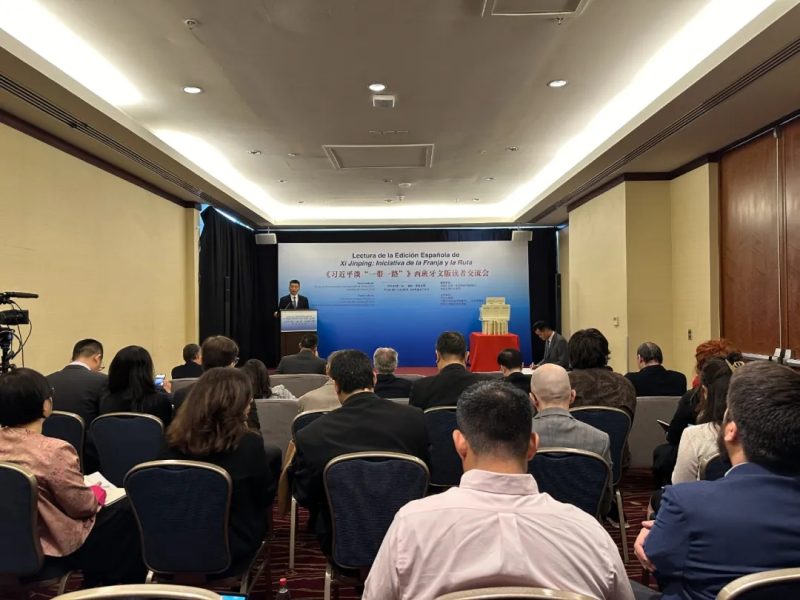
▲ Venue of the event
Around 50 guests attended the event, including CICG Vice President Yu Tao, Political Counselor at the Chinese Embassy in Chile Ma Zhen, former Chilean Ambassador to China and Director of the Center for Latin American Studies on China at Chile’s Andres Bello University Fernando Reyes Matta, Deputy Director of the Institute of International Studies (IEI) at the University of Chile Ricardo Gamboa Valenzuela, former Director of the Division of Asia-Pacific and Division of Strategic Planning at Chile’s Ministry of Foreign Affairs and Associate Professor of the IEI at the University of Chile Carlos Olguín, General Manager of Radio Cooperativa Luis Ajenjo Isasi, President of the José Venturelli Foundation Malva Venturelli, and President of Foreign Languages PressHu Kaimin. Guests from sectors including politics, academia, and culture in Chile participated in the event. Director of CICG’s Department of Coordination and Management Xin Feng hosted the event.
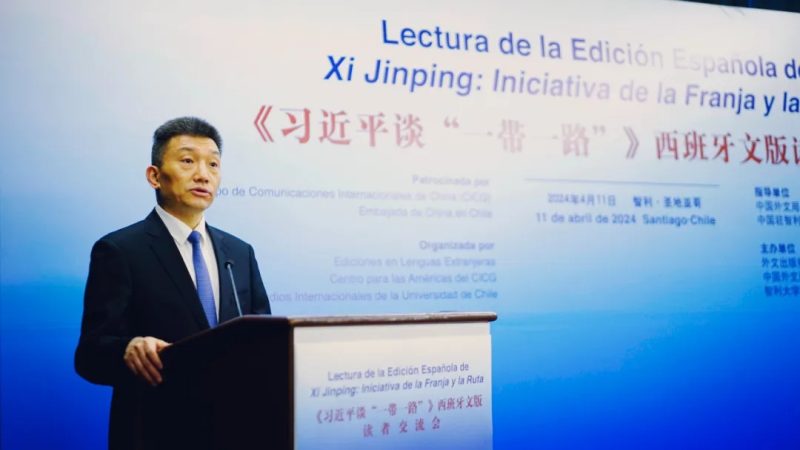
▲Yu Tao delivering a speech
Yu Tao noted in his speech that the Belt and Road Initiative (BRI) proposed by President Xi Jinping and its global practice have yielded fruitful outcomes, forming a path towards a global community of shared future for the benefit of humanity, a path of common development and win-win cooperation, and a path of mutual learning among civilizations for closer people-to-people ties. With that, the BRI has provided a new option for the advancement of human society and civilization. Chile was the first Latin American country to publicly back the BRI, and under the framework, China and Chile have seen solid cooperation in infrastructure, building ports, subways, and highways, and in science and technology, exemplified by tech centers. Such projects have helped to accelerate Chile’s economic transformation and upgrading, bringing tangible benefits to its people. Yu hopes that through the publication, distribution, and promotion of the Spanish edition of The Belt and Road Initiative by Xi Jinping, readers in Chile and Latin America will better understand the BRI and the vision of a global community of shared future. He hopes the book will contribute to high-quality Belt and Road cooperation, boosting mutual learning and friendship between China and Chile, as well as between China and other Latin American countries.
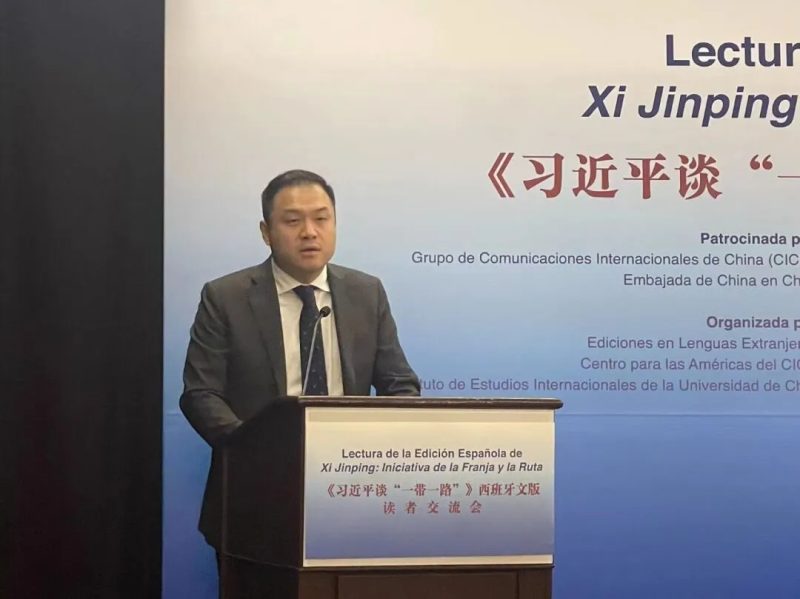
▲Ma Zhen delivering a speech
Ma Zhen also highlighted Chile in his speech as the first Latin American country to endorse the BRI and sign cooperation memorandums of understanding (MOUs) and cooperation plans, noting that it was the only Latin American country whose head of state had attended all three Belt and Road Forums for International Cooperation (BRF). He stated that the event was a typical example of China-Chile relations, which had long led the way in China-Latin America relations, and that it injected new impetus into BRI cooperation between the two countries. With the publication and distribution of the book, people from various sectors of Chile now have a vivid, informative, and authoritative source to better understand the BRI, which in turn will play a positive and important role in helping Chile participate more effectively in the cooperation.
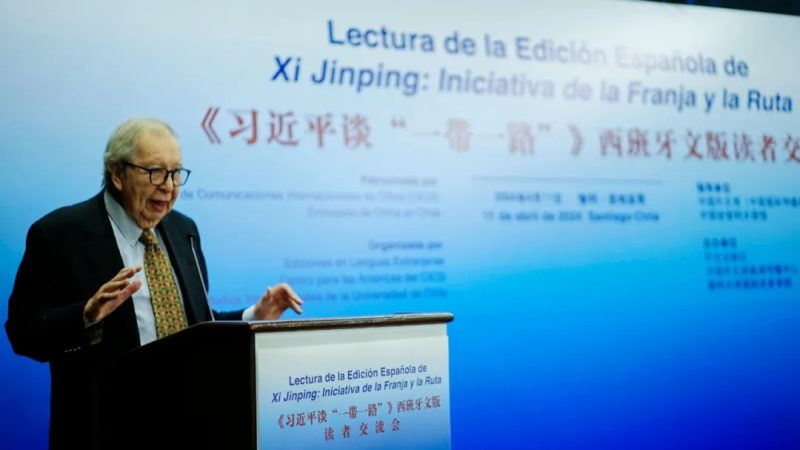
▲Fernando Reyes Matta delivering a speech
Fernando Reyes Matta cited in his speech President Xi Jinping’s perspective that Chinese modernization was different from that of the West, and that it pursues peaceful development and contributes to common development and common prosperity for all countries. He noted that BRI cooperation is a vivid example of this, as a pathway towards modernization to benefit the international community. Recently, President Xi Jinping proposed the development of new quality productive forces to drive high-quality economic and social development. The Spanish edition of The Belt and Road Initiative by Xi Jinping is expected to help readers in Latin American countries understand China’s visions and policies, providing a new way of thinking to promote cooperation between China and Chile in the economy, trade, and artificial intelligence, as both countries enter a new era of win-win cooperation.
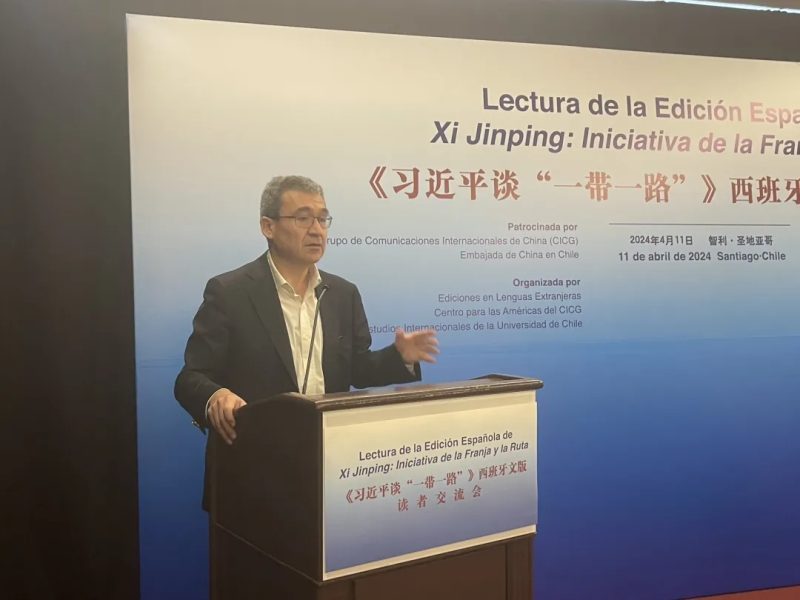
▲Ricardo Gamboa Valenzuela delivering a speech
Ricardo Gamboa Valenzuela highlighted in his speech that the Institute for International Studies of the University of Chile was closely following China’s growing role in Latin America and other parts of the world. He stated that the publication of the Spanish edition of this book provides university professors and students with an authoritative source to enhance their knowledge of China, and expressed his desire to see more books on the BRI and China’s development in Spanish available in Chile.
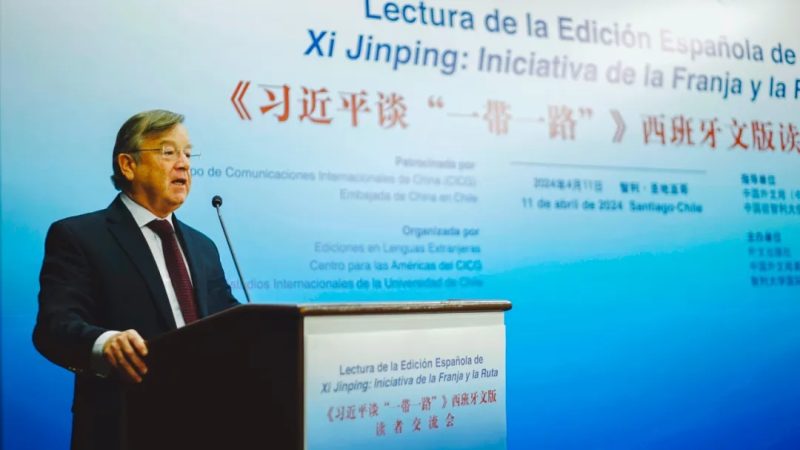
▲Carlos Olguín delivering a speech
Carlos Olguín provided data and specific case studies to demonstrate the fruitful achievements and practical benefits that the BRI had brought to partner countries. He noted that the initiative had helped many countries achieve economic transformation and upgrading, hoping that it would continue to bloom like spring flowers.
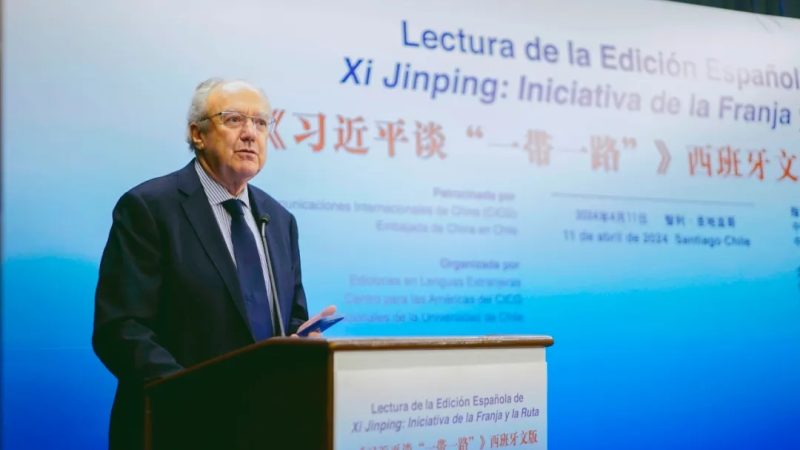
▲Luis Ajenjo Isasi delivering a speech
Luis Ajenjo Isasi noted in his speech that China has long been Chile’s most important trading partner, and the total trade volume between Chile and China has increased by as much as 14 percent since the implementation of the BRI more than 10 years ago. In this era of rapid media development, he hopes readers will better understand China and its culture through this book and also through social media.
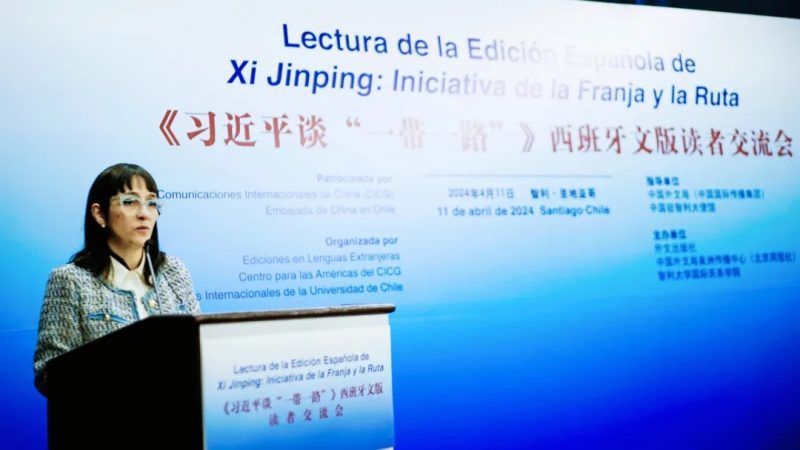
▲Malva Venturelli delivering a speech
Malva Venturelli shared the lifelong dedication of her grandfather, the founder of the José Venturelli Foundation, in promoting cultural exchanges between China and Chile. She noted that the purpose of the BRI was to foster mutual understanding, inclusiveness, support, and trust among humanity, and she hopes that this book can reflect the cultural value of the initiative and guide more people towards the ultimate goal of a global community of shared future.
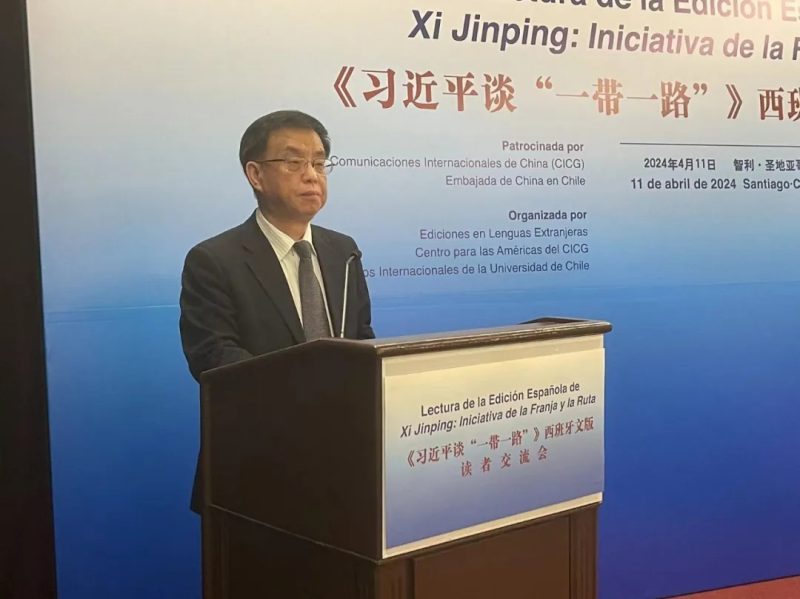
▲Hu Kaimin delivering a speech
Hu Kaimin highlighted in his speech that the book contains important works by President Xi Jinping on the BRI. For readers from all walks of life in Chile and other Latin American countries, the book will provide an authoritative source to understand the significance and development of this initiative, the vision of a global community of shared future, and the Communist Party of China (CPC)’s pursuit of wellbeing for all of humanity. With its publication and distribution, it will also deepen people’s understanding of the BRI in Chile and other Latin American countries, build a new bridge and cultural bond for people-to-people exchanges between China and Chile, and facilitate understanding among civilizations in China and Latin America.
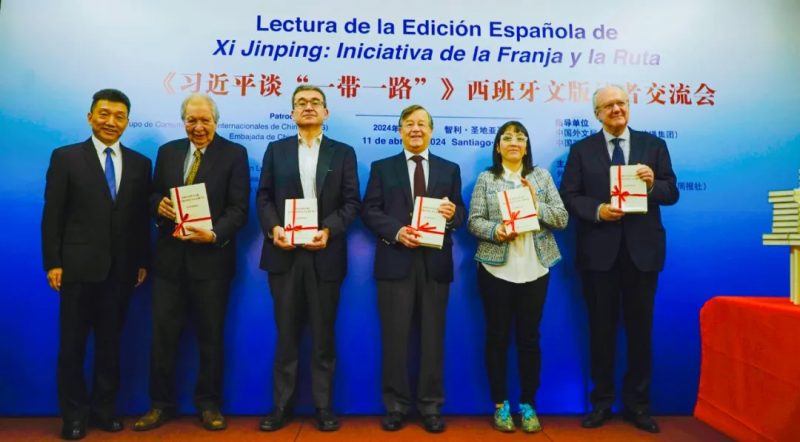
▲Book presentation
Yu Tao presented the Spanish edition of The Belt and Road Initiative by Xi Jinping to the Chilean guests.
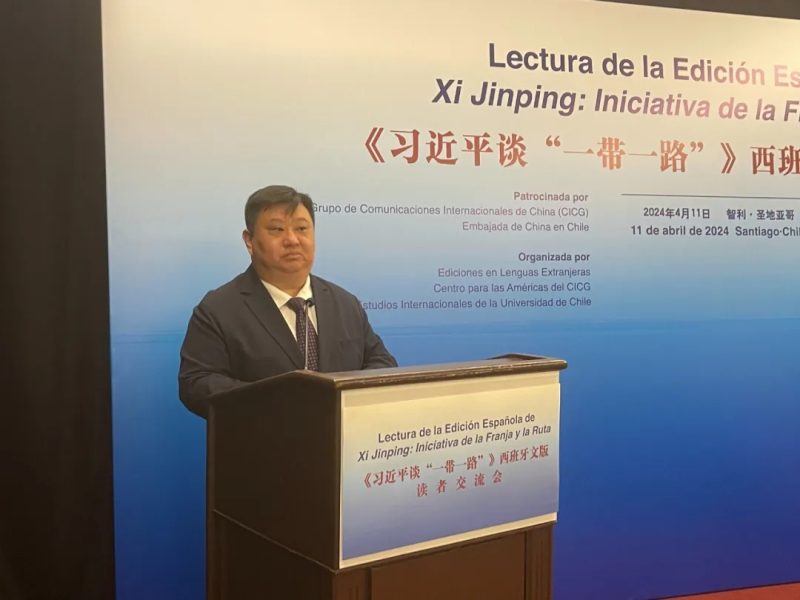
▲Xin Feng, host of the event
The book incorporates 42 articles written by President Xi between September 2013 and July 2018 on jointly advancing BRI cooperation and records in detail how the BRI was proposed, enriched and developed. It also elaborates on the BRI’s principles, connotations and objectives, providing authoritative interpretations for readers at home and abroad to increase their understanding of the initiative.
